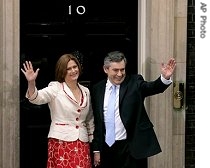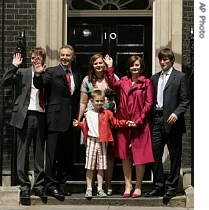2007年VOA标准英语-Blair Named Mideast Envoy, Brown Takes Over As
时间:2019-01-13 作者:英语课 分类:2007年VOA标准英语(六月)
London
27 June 2007
Gordon Brown took over as Britain's new prime minister after his long-time political friend and rival, Tony Blair stepped down just hours earlier, after 10 years in office. VOA's Sonja Pace reports from London on the transfer of power and on Mr. Blair's appointment as special international peace envoy 1 to the Middle East.
It was a day of political tradition, ceremony and drama, the official transfer of power from one prime minister to another.

Gordon Brown (r) and his wife Sarah at 10 Downing Street, 27 Jun 2007
Returning from his meeting with Queen Elizabeth II at Buckingham Palace, Gordon Brown came to his new official residency, Number 10 Downing Street, and promised new priorities.
"I have just accepted the invitation of her Majesty 2 the Queen to form a new government," said Mr. Brown. "This will be a new government with new priorities."
Mr. Brown vowed 3 to reach out beyond what he called narrow party interests.
Just hours earlier, his predecessor 4, Tony Blair made his last appearance in the House of Commons.
Mr. Blair opened the session on a sober note, expressing condolences to the families of three British servicemen killed in action.

Britain's Prime Minister Tony Blair, second left, leaves No. 10 Downing Street for the last time as Prime Minister, as he stands with family in central London, 27 June 2007
"I am truly sorry about the dangers they face today in Afghanistan and Iraq. I know some people think they face these dangers in vain. I don't and I never will," said Mr. Blair.
Mr. Blair has remained steadfast 5 in his support for intervention 6 in Afghanistan and in Iraq, even amid increasing public opposition 7.
Over the years, he faced many tough questions in this chamber 8, especially from the opposition Conservative party.
Yet on this day, there were also tributes, including from Conservative party leader, David Cameron.
"For 13 years he has led his party, for 10 years he has led our country and no one can be in any doubt in terms of the huge efforts he has made, in terms of public service," said Mr. Cameron. "He has considerable achievements to his credit, whether it is peace in Northern Ireland, whether it is his work in the developing world, which I know will endure."
And, in the end Mr. Blair also paid tribute to his colleagues in the House of Commons.
"I can pay the House the greatest compliment I can by saying that from the first to last I never stopped fearing it," he added. "That tingling 9 apprehension 10 that I felt at three minutes to twelve today I felt as much 10 years ago and every bit as acute. And it is in that fear, the respect is contained."
Amid a standing 11 ovation 12 in the House of Commons, Tony Blair left the chamber. He returned to 10 Downing Street for final farewells to staff member before heading to Buckingham Palace to formally hand in his resignation to the Queen.
Shortly thereafter, Gordon Brown was summoned for a private audience with the Queen to be confirmed as Britain's new prime minister.
And, within hours the announcement from the United Nations that Tony Blair has been named as representative to the so-called Middle East Quartet - made up of the United States, Russia, the European Union and the United Nations. The Quartet seeks to end the Israeli-Palestinian conflict.
- Their envoy showed no sign of responding to our proposals.他们的代表对我方的提议毫无回应的迹象。
- The government has not yet appointed an envoy to the area.政府尚未向这一地区派过外交官。
- The king had unspeakable majesty.国王有无法形容的威严。
- Your Majesty must make up your mind quickly!尊贵的陛下,您必须赶快做出决定!
- He vowed quite solemnly that he would carry out his promise. 他非常庄严地发誓要实现他的诺言。
- I vowed to do more of the cooking myself. 我发誓自己要多动手做饭。
- It will share the fate of its predecessor.它将遭受与前者同样的命运。
- The new ambassador is more mature than his predecessor.新大使比他的前任更成熟一些。
- Her steadfast belief never left her for one moment.她坚定的信仰从未动摇过。
- He succeeded in his studies by dint of steadfast application.由于坚持不懈的努力他获得了学业上的成功。
- The government's intervention in this dispute will not help.政府对这场争论的干预不会起作用。
- Many people felt he would be hostile to the idea of foreign intervention.许多人觉得他会反对外来干预。
- The party leader is facing opposition in his own backyard.该党领袖在自己的党內遇到了反对。
- The police tried to break down the prisoner's opposition.警察设法制住了那个囚犯的反抗。
- For many,the dentist's surgery remains a torture chamber.对许多人来说,牙医的治疗室一直是间受刑室。
- The chamber was ablaze with light.会议厅里灯火辉煌。
- My ears are tingling [humming; ringing; singing]. 我耳鸣。 来自《现代汉英综合大词典》
- My tongue is tingling. 舌头发麻。 来自《现代汉英综合大词典》
- There were still areas of doubt and her apprehension grew.有些地方仍然存疑,于是她越来越担心。
- She is a girl of weak apprehension.她是一个理解力很差的女孩。
- After the earthquake only a few houses were left standing.地震过后只有几幢房屋还立着。
- They're standing out against any change in the law.他们坚决反对对法律做任何修改。